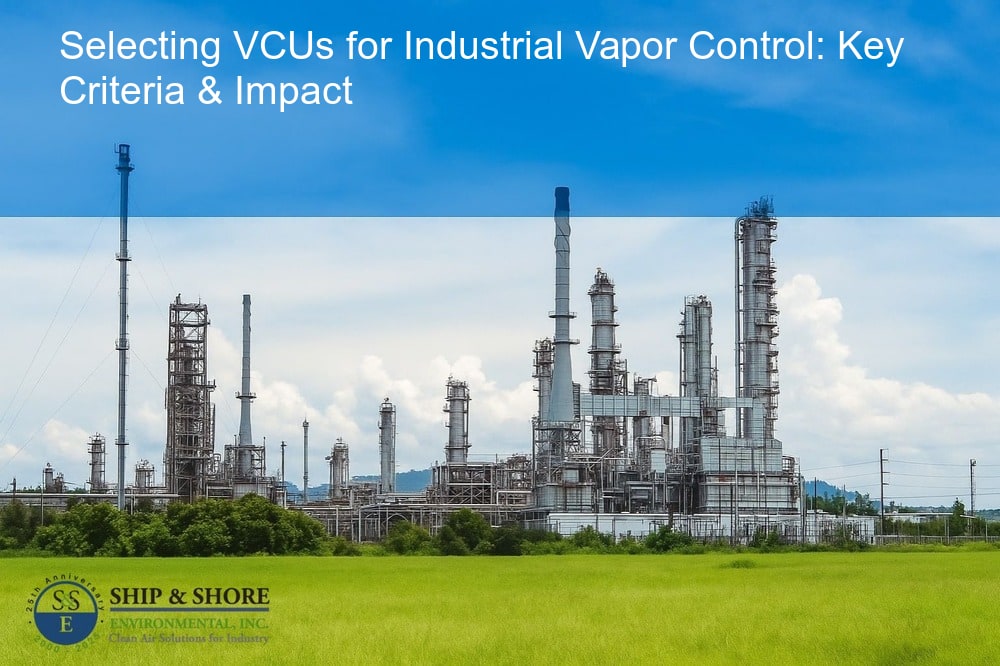
Mastering Selecting VCUs for Industrial Vapor Control
October 31, 2025 5:09 amThe Importance of Vapor Control in Industrial Operations
In the landscape of industrial operations, environmental management and regulatory compliance are critical to sustainable growth. Selecting VCUs for industrial vapor control is one pivotal decision that can significantly influence an organization’s performance and adherence to environmental standards. Vapor Control Units (VCUs) play a vital role in mitigating harmful emissions, safeguarding the environment, and ensuring the safety and well-being of employees and the surrounding community.
An Overview of Vapor Combustion Units (VCUs) in Industry
Vapor Combustion Units, or VCUs, are sophisticated systems designed to manage and neutralize organic vapor emissions from industrial processes. By converting hazardous vapors into less harmful emissions through combustion, VCUs are integral to pollution control strategies. These units are employed across a diverse range of industries, including petrochemical, pharmaceutical, and manufacturing sectors. This conversion process not only helps companies comply with stringent environmental regulations but also drives efficiency in operations by reducing potential pollutant levels.
Why Selecting the Right VCU Matters
Choosing the appropriate VCU is not merely a compliance measure; it is a strategic decision that can have far-reaching consequences. The efficiency, reliability, and compatibility of a VCU with existing systems can profoundly impact operational costs, safety protocols, and overall environmental responsibility. A well-suited VCU ensures that vapor control processes are optimized, minimizing disruptions and maximizing productivity. With numerous models and technologies available, understanding the specific needs of your operation is critical to making an informed selection.
Key Factors in Selecting VCUs for Industrial Vapor Control
When it comes to industrial operations, selecting VCUs for industrial vapor control is critical. There are several factors that must be considered to ensure that the selected unit not only meets operational needs but also adheres to regulatory compliance and cost efficiency. Foremost among these is identifying the operational environment and the type of vapors that need to be controlled. Assessing the emission levels and the substances involved helps in narrowing down the choices to units that are most effective for specific applications.
Additionally, the technological capabilities of the VCU must align with the industrial process requirements. Technologies such as enclosed flares, thermal oxidizers, and catalytic oxidizers each have their strengths and drawbacks depending on the nature of the vapors. For instance, enclosed flares are often chosen for their high destruction efficiencies and reliability under varying load conditions. Thus, understanding the intricacies of VCU technology is a cornerstone in making an informed selection.
Performance Requirements and Evaluating the Operational Efficiency of a VCU
Selecting a Vapor Combustion Unit that performs efficiently is paramount. But what defines good performance in a VCU? Primarily, a unit’s destruction removal efficiency (DRE) which measures its ability to effectively combust hydrocarbons and other volatile organic compounds (VOCs) points to its operational efficiency. Units with higher DREs are certainly preferable, yet their energy consumption and operational costs must also be weighed.
For effective evaluation, consider the following:
- Consistency in achieving high destruction efficiencies across varying operational loads.
- Ease of maintenance and operational lifespan of the unit.
- Flexibility to handle both peak and off-peak load conditions, ensuring efficiency regardless of operational fluctuations.
VCUs often have diagnostic and control systems, allowing operators to continuously monitor performance and make necessary adjustments. This ensures sustained operational efficiency over long periods. Transitioning seamlessly between these performance metrics will help us understand how well the unit will integrate with our existing operations.
Compliance, Safety, and Cost: Aligning VCU Selection with Business Goals
Compliance with regulatory standards is non-negotiable, and the selected VCU must meet or exceed all pertinent environmental and safety regulations. In essence, the VCU should ideally be compliant with current EPA standards for emissions. As regulations are subject to change, a future-proof VCU might also be considered, one that can handle stricter regulations anticipated in coming years. Hence, it is prudent to select a VCU with a built-in capacity to adapt to or exceed evolving standards.
Safety is another significant consideration. We must consider units equipped with advanced safety features such as automated shut-down systems in case of malfunctions and rigorous monitoring technologies to prevent hazardous situations. Effective safety mechanisms not only protect the facility and its personnel but also minimize the risk of non-compliance resulting from unexpected breakdowns.
Cost-effectiveness encompasses both the initial investment and the ongoing operational expenses. While high-end VCUs with advanced features might seem expensive, their long-term operational savings and reduced maintenance costs often justify the investment. Computing the return on investment (ROI) based on these factors will guide us in making a sound financial decision.
All the considerations intertwine to create a balanced decision-making process. By prioritizing operational efficiency, regulatory compliance, safety, and cost-effectiveness, selecting VCUs for industrial vapor control becomes an optimized process tailored to meet both our immediate and long-term goals.
Did you know? Choosing the right Vapor Combustion Unit (VCU) for industrial operations not only ensures regulatory compliance but can significantly enhance operational efficiency and safety.
The Potential Impact of Correct VCU Selection on Industrial Operations
Choosing the appropriate vapor combustion unit (VCU) is more than just a technical decision; it is a strategic move that influences many facets of our industrial operations. The right VCU ensures efficient vapor combustion, seamlessly aligns with compliance standards, and bolsters safety and cost-efficiency. By embedding the optimal VCU into our system, we are empowered to streamline processes, minimize volatile organic compound (VOC) emissions, and foster a healthier working environment. The ripple effect of such an integration can boost operational efficiency and strengthen our industry’s contribution to environmental sustainability.
Key Considerations Recap: Locking in the Right VCU for Your Needs
As we delve into selecting VCUs for industrial vapor control, it is crucial to underscore the primary considerations. First, evaluating the performance requirements allows us to gauge how well a VCU can handle the specific operational dynamics and volume of emissions. Second, an emphasis on compliance ensures that our VCUs adhere to stringent environmental guidelines, mitigating the risk of regulatory penalties. Lastly, balancing cost against performance and compliance guarantees that our investment in VCUs delivers significant returns without compromising quality or safety. Paying keen attention to these factors helps us make informed decisions that resonate with our long-term strategic goals.
Future Outlook: The Role of VCUs in Sustaining Industrial Growth and Environmental Standards
Looking ahead, the role of VCUs in our industrial landscape will continue to evolve, driven by advances in technology and stricter environmental regulations. The importance of selecting VCUs for industrial vapor control cannot be overstated, as industries strive to adopt sustainable practices. By continuously innovating and optimizing vapor control strategies, we can ensure that our operations remain efficient, cost-effective, and environmentally compliant. This proactive approach not only secures our competitive edge but also demonstrates our commitment to responsible industrial growth and stewardship of the planet.
FAQ
What are the primary factors to consider when selecting a VCU for industrial vapor control?
In choosing a Vapor Combustion Unit (VCU) for industrial vapor control, it is vital to consider performance characteristics and whether the unit can handle the volume and characteristics of your emissions. Additionally, compliance with environmental regulations and safety standards is non-negotiable. Equally, evaluating the cost effectiveness of the unit, both in terms of initial investment and operational expenses, is crucial for aligning with business objectives and ensuring a favorable return on investment.
How does the correct VCU selection contribute to operational efficiency?
Investing in the right VCU enhances operational efficiency by ensuring that vapor combustion processes are conducted effectively, reducing downtime. Moreover, it supports the achievement of compliance targets, thereby avoiding potential fines and operational disruptions. Furthermore, a carefully selected VCU can minimize environmental impact and prepare industries for future regulatory changes, ensuring long-term operational sustainability.
Why does compliance and safety play a significant role in VCU selection?
Compliance and safety are integral when selecting a Vapor Combustion Unit because they safeguard against legal and financial penalties associated with environmental violations. Beyond that, prioritizing safety mitigates workplace hazards, protecting employees and the environment. Ultimately, choosing a VCU that upholds these standards is a testament to a company’s dedication to responsible industry practices and corporate stewardship.
Can the choice of a VCU affect cost management in industrial operations?
Indeed, the selection of a VCU can have a profound effect on cost management. Initial acquisition costs, operational expenses, and potential savings from efficient energy use and reduced emissions must all be balanced. An effective VCU can contribute to reduced operational costs over time, as well as minimize the costs associated with non-compliance and safety incidents.
What is the future outlook for VCUs in relation to industrial growth and maintaining environmental standards?
As industries continue to advance and environmental regulations become more stringent, the role of VCUs is expected to grow in significance. Future outlook suggests an increased reliance on VCUs to manage emissions efficiently, while also adapting to new technologies that enhance performance and sustainability. Proactive adaptation of these systems is essential to ensure that industrial operations can flourish while concurrently upholding high environmental standards.
Categorised in: Blog

